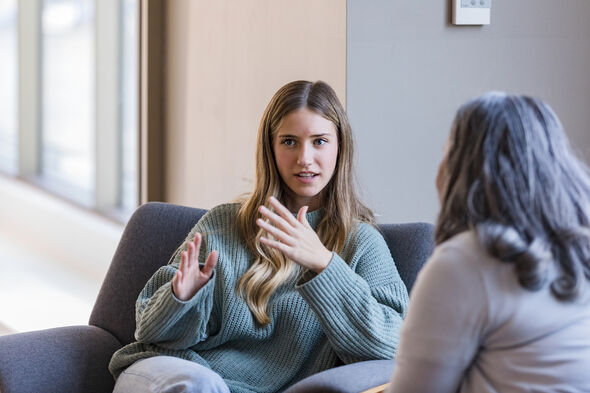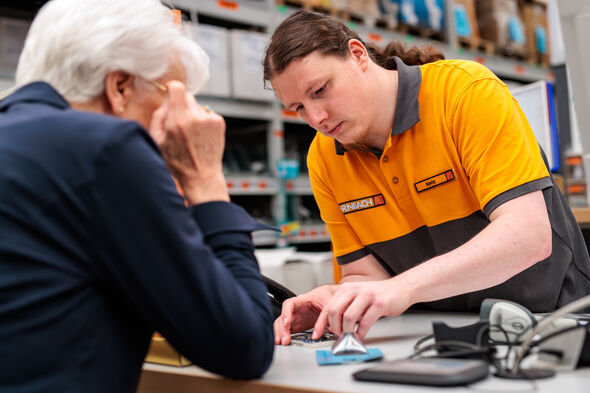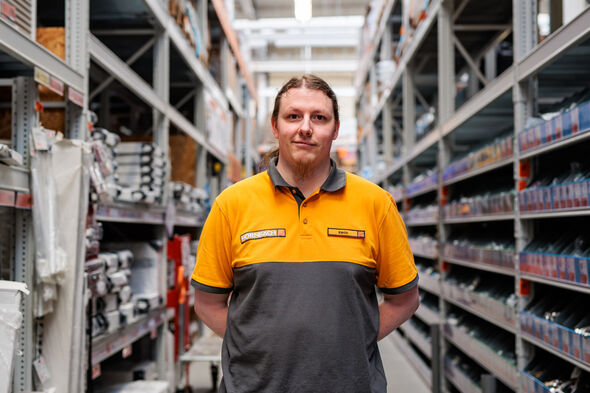A bright career for everyone?
Three graduates talk about their participation in Career Jumpstart
Read more- People , Student
- 29/05/2023
A bright career for everyone?
If you have completed a technical program, a great career lies ahead of you. But what if you get bogged down in the application process? This can happen to graduates – and students looking for a graduate internship – with a neurodivergence (such as ADHD or ASD), psychological vulnerability, physical impairment or complex home situation. They can seek help from Career Jumpstart, a career center set up by Fontys and TU/e for students with support needs. Each trajectory is customized to the individual because each situation is unique. In this article, three participants tell their personal stories.
One year ago, Kim Pril and Manon Krabbenborg introduced Career Jumpstart to Cursor, together with their colleague Marlou Heskes. Pril, who works at ESA, is the point of contact for the program within TU/e and Manon Krabbenborg is a coach. As a lecturer-researcher at Fontys, she is also closely involved in the development and evaluation of Career Jumpstart.
In the pilot phase, the departments Applied Physics, Electrical Engineering and Mechanical Engineering were involved in the program, but now, Career Jumpstart is available to all TU/e students. From 2024, TU/e will also contribute to the funding, which is currently provided by Fontys, the municipality of Eindhoven and the ASML Foundation.
What is the current state of affairs? Krabbenborg: “In total, we have coached or are currently coaching 97 candidates. 22 of them are from TU/e.” Those participants come from all sorts of programs - not just from the departments actively promoting Career Jumpstart. “They studied Applied Physics, Electrical Engineering, Industrial design, Architecture, Urbanism and Building Sciences, Biomedical Engineering, and Data science.”
Of the 22 TU/e participants, ten have now found a job or graduate internship. Below, three of those ten talk about the obstacles they encountered on their way and how they overcame them - either anonymously or not.
Highly educated young people with a disability struggle to find jobs
As a young person with support needs, it is very difficult to find employment in the Netherlands. “Nowhere in Europe is the difference in chances of employment between people with and without disabilities as great as in the Netherlands and Hungary,” according to the Expert Center on Inclusive Education (ECIO).
This group falls between the cracks due to the way the system is set up, explains ECIO: “Strictly speaking, the responsibility from the educational system ends after graduation. The responsibility of municipalities only starts when the person applies for benefits.”
This is not only unfortunate for the affected group of starters, but also for employers who are in need of skilled personnel. For this reason, ECIO is working together with Berenschot, De Nederlandsche Bank, HU University of Applied Sciences Utrecht, Utrecht University and Solgu on “an inclusive connection between higher education and knowledge-intensive employers.”
Career Jumpstart is also working with ECIO in this area, as an inspiring practical example of what it can look like.
Kyra: “The fear of failure I’d come to know from my studies reared its ugly head"
One by one, Kyra (now 24, full name known to Cursor) from Eindhoven saw her friends from university find their first real jobs, while she herself was still cooped up at home. “The graduation process at Industrial Design had taken a lot out of me, and I was mentally drained after that period. I wasn’t ready yet.” So she took a break.
After a while, she wanted to start seriously applying for jobs, but she just could not bring herself to do so. “The fear of failure which I’d also struggled with during my studies reared its ugly head. I got scared of actually starting work and having to perform. I thought I was supposed to know and be able to do everything right away.”
“As a result, I started to put things off: ‘'I’ll write that cover letter next week,’ only to find that the job offer had already expired.”
During her studies, she managed to tame her fear of failure by teaming up with fellow students on projects. “And during the graduation process, I was part of an intervision group at Study Management, which really helped me.” The deadlines she agreed on with fellow students served as a big stick that helped her to control her procrastination.
Small step
The job search was also a project Kyra initially took up jointly. “Together with the friends who had graduated at the same time as me. But eventually, they all found jobs, and I didn't.”
Around that time, she spoke to a friend who happened to have heard of Career Jumpstart. She decided to send an email. Didn’t she put off writing that email for a few weeks as well? Kyra laughs. “No, I thought: I can use a little help. And it was a small, manageable step.” But definitely an important first step towards a successful job hunt, as soon became apparent.
“I was invited for an intake meeting and I clearly remember the coaches telling me: ‘We’re just going to do it together.’ That really struck a chord with me: I was not alone. Because whereas I’d always felt part of a group during my studies, now I was suffering from the stress of starting a career on my own, stepping into an employer’s office on my own.”
Interview
And after that, everything happened so fast all of a sudden. “During a coaching session, we discussed which job openings I had seen, and agreed on action points, sort of like homework. For example: write that cover letter.”
And sure enough: “I’d been hesitant about applying for a job for a really long time, but now things were going very smoothly. I found a really great job opening at a social design studio, for a position that was just right. It suited all of my requirements.”
“In two days’ time I wrote a letter, sent it, was invited and went for an interview. And two weeks later, it was final: I had a job! Just like that.” A job Kyra is very excited about. And where she gets to learn at a comfortable pace. “Because of course, as a recent graduate you’re not expected to know and be able to do everything right away - which is what I was afraid of.”
Phone calls
“Fortunately, during this exciting time when I went for the interview, was hired, had to agree to terms of employment and sign my contract, my coach Luca Smeets was often available for consultations over the phone.”
And the sessions continued even when Kyra started her job. “Which I really appreciated, because those first weeks were quite stressful. We’re currently winding down the coaching sessions because I feel like I’m at the right place. And that feels good too.”
Kevin: “Ultimately, you have to do it yourself, but you don’t have to do it alone”
It was only six months ago that Kevin van der Linden (34) was diagnosed with ADD. Nonetheless, the TU/e Applied Physics student is happy with the label, because it explains a lot.
“That I work in a very structured way, for instance – a coping mechanism – but also the fact that, despite this, I often don’t finish things. It’s also reassuring to know that all of this is not due to my personality but that there is a physiological explanation. I take ritalin now and it helps.”
ADD is not the only hurdle on Kevin’s study and career path. He has a somewhat “complicated life,” as he puts it, almost apologetically.
“For the past twenty years, I’ve suffered from chronic 24/7 headaches. As a result, I can't study or work full-time. I also lost my mother as a student, which affected me greatly. And I’m a caregiver for my chronically ill partner. That takes up about two days of my week.”
Now what?
Because of all of these things combined, Kevin has yet to graduate at 34. “I completed my bachelor’s and apart from my final project, I also completed all of my master’s requirements. When I got stuck during my graduate internship, I put my studies on hold. And I thought: now what?”
When he talked about this with a supervisor from his graduation group, she informed him about Career Jumpstart. And that has been very helpful to him, Kevin says. “My experience with coaching and other counseling is that they often work with a set script. But what Manon (Krabbenborg, his coach, Ed.) does is true customized coaching.”
In Kevin’s case, that meant starting at the beginning. “I didn’t even know exactly what it was that I needed help with. Do I want to choose a new final project? Or look for a job? On the one hand, the program is a great fit for me in terms of content and level, and I really want to get that engineering degree. On the other hand, I’m also eager to start working, have a structural income, and build up a livelihood at my age.”
Insights
Therefore, the coaching began with mapping out the fundamentals: “Who am I? What problems do I run into? After the intake interview, I completed questionnaires and assignments to map out my personality and core values.”
Some results were unsurprising; others brought new insights. “For example, in addition to openness and integrity, care turned out to be an important value for me as well. This is reflected in the informal care I provide, but I hadn't drawn the link to my professional life. Such new insight into myself helps me make choices.”
What is also important are the preconditions: “I have to be able to do a job – or final project – on a part-time basis. Not all places offer that option. In addition, the workplace must accommodate my sensitivity to stimuli.”
Hornbach
And then, it all came down to taking steps – no matter how small. Though that is easier said than done. “Fortunately, the people at Career Jumpstart know how difficult this can be and support you in this. Because actually experiencing something is very different from just knowing it in the back of your mind.”
Kevin actively familiarized himself with the job market, for example by talking to a recruiter. But ultimately it was an aside from Manon that made the difference. “She was busy working on her new house and so she found herself shopping at the hardware store all the time. “How would you feel about working at a hardware store?” she asked.”
At first, Kevin thought: what makes you think that? But a week later, the idea had grown on him. And now I’ve been working at Hornbach two days a week for several months, to our mutual satisfaction!” Not because it’s his calling, but because it’s a good intermediate step for him to gain knowledge and experience.
Independent
“For example, my job at Hornbach not only allows me to have fun, I also get a steady work rhythm – at my side job at the TU/e particle accelerator, I work mostly at night. In addition, I gain experience with all kinds of aspects of working life: colleagues, administration. And I can express my caring side through customer contact: it gives me great satisfaction to help customers."
How does he envision the future? “For now, I will continue along this path, but in the meantime, I’ll keep taking steps towards the future – whether that leads to an engineering degree or not. In any case, my study results will remain valid for the time being. And fortunately, the coaching from Career Jumpstart doesn’t just stop when I get the right job, but continues afterwards.”
Finally, a word of advice for those who identify with Kevin’s story: “Don’t hesitate to seek help. I was taught that you should solve your own problems and be independent. And at TU/e, you also learn to analyze and tackle problems yourself. Ultimately, you have to do it yourself – it’s up to you – but you don’t have to do it alone.
Iris: “I feel like I can make a difference here”
“I had my sights set on a PhD position, but when that dream was shattered, I got stuck.” After completing her master’s degree in Human-Technology Interaction, Iris (27, full name known to editors) was eager to continue working in research. However, life had other plans.
“During my graduation process, I was diagnosed with a chronic disease. Because of that disease, I have a reduced ability to work, so I had to come to terms with the fact that completing a doctoral program is not feasible for me.”
Iris had to learn to live with her disease and at the same time process the fact that the career dream she had been focusing on up to that point was not meant to be. In addition, she had to figure out where she would want to – and be able to – work instead.
Shift gears
“Until then, I’d only looked for PhD positions, so I really had to shift gears. Besides, I really wanted to continue in my field, but almost all the job openings I found required a PhD,” Iris explains. “On top of that, I have autism, which makes it difficult for me to network – this would otherwise have been a good way to find a job, indirectly via someone else.”
That combination of factors caused her to get stuck. After months of fruitlessly scouring job sites, she ended up at Career Jumpstart. “The first appointment immediately raised my spirits: whereas I couldn’t see any more opportunities myself, my coach immediately came up with all kinds of ideas and contacts that could help me move forward.”
That helped. “My coach was very understanding and very practical at the same time. Her first step was to offer me a resume and job interview course. She also put me in touch with interesting employers – because of course, she is very good at networking!”
After a short search, this resulted in not one, but two suitable job opportunities. “I applied to two different places and had several interviews there as well. Both job opportunities were interesting and suitable options for me.”
She chose for a position as an assistant teacher and researcher at a higher vocational education institution, where, after a few hurdles in the hiring process – “partly because of the moment I applied: in the middle of the academic year” – she found a nice, challenging workplace. “I’m combining my job with a BKR trajectory. With that teaching certification, I’ll be able to get a permanent position as a teacher and researcher soon.”
Muddling through
How was the transition from the university world to the world of higher vocational education for her? “It took some getting used to because higher vocational education and the university each have a different focus, for instance in the field of research. So I did have to adjust my expectations, but now I feel right at home here. “I feel like I can make a difference here and really contribute something. There’s no better motivation!”
Iris advises people in a similar situation not to keep muddling through on their own for too long. “I personally assumed that I wouldn’t be able to teach without a PhD – or a degree in primary teacher training – let alone combine teaching with research. But as it turned out, that’s entirely possible.” On that note, she concludes: “Don’t hesitate but start looking for the help you need in time! There are many things we have to do alone, but this doesn’t have to be one of them.”
Are you a student with support needs and would like to receive guidance in finding a job? Visit the Career Jumpstart website or send a message to careeracademy@tue.nl, with “Career Jumpstart” as the subject.





Discussion